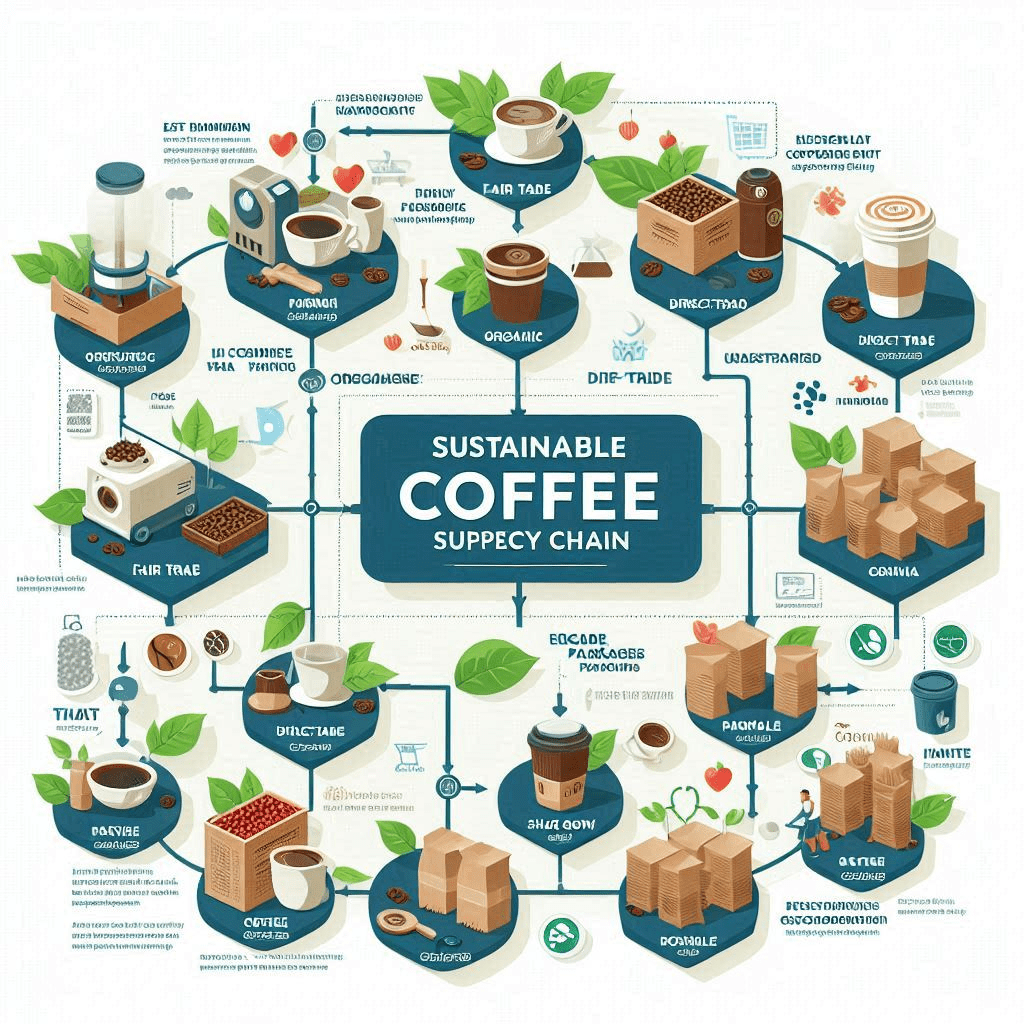Coffee, that aromatic elixir that graces our mornings and fuels our afternoons, has a journey as complex as its flavor. From the verdant coffee fields to the comforting warmth of our cups, the sustainable coffee supply chain weaves together a tale of cultivation, trade, and ethical practices.
The Coffee Journey: Managing the Supply Chain
- Harvest to Roast
In the heart of coffee-growing regions, skilled hands pluck ripe cherries from coffee trees. These cherries hold the promise of rich flavors. Swift processing is essential to preserve their essence. Modern methods ensure efficiency, allowing cherries to transform into green beans ready for export.
- Worldwide Travel
Coffee transcends borders. It’s an international commodity, traversing oceans and continents. Supply chain optimization ensures timely delivery. Distribution networks, like intricate spiderwebs, connect coffee-producing countries to coffee-loving consumers.
- Quality Control
Well-brewed coffee is an art. At every stage, quality matters. Inspections, guidelines, and rigorous checks ensure that each cup meets expectations. From farm to roastery, the pursuit of excellence remains unwavering.
Sustainability Matters
- Environmental Practices
Sustainable coffee farming embraces eco-friendly methods. Pesticides are renounced, and genetic modifications are shunned. Natural resources are protected, ensuring that coffee cultivation doesn’t harm the planet.
- Fair Trade Initiatives
Fair-trade coffee isn’t just a buzzword; it’s a lifeline for farmers. The Triple Bottom Line—social, ecological, and economic—guides fair trade practices. Regulated working conditions and the prohibition of child labor are non-negotiable.
- Ethical Sourcing
Transparency flows through the supply chain. From bean to cup, we trace the journey. Regulated minimum prices empower farmers. Ethical sourcing ensures that every sip supports livelihoods.
The Importance of Sustainable Coffee Farming
Why Sustainable Coffee Farming is important? Sustainable coffee farming isn’t a luxury; it’s a necessity. It safeguards ecosystems, uplifts communities, and ensures that our morning ritual doesn’t come at the cost of someone else’s well-being. When you savor that cup of coffee, remember the hands that nurtured it—the farmers who toil under the sun, the pickers who select cherries with care. Their commitment sustains our love affair with coffee.
Innovative Technology in Supply Chain Optimization
In the realm of coffee, tradition meets innovation. The supply chain, once a linear path, now embraces technology to become more efficient and transparent. Let’s delve into how cutting-edge tech is revolutionizing the journey of coffee.
Blockchain: A New Era of Transparency
Blockchain technology is a game-changer. It brings unmatched transparency to the coffee supply chain. Every bean’s journey is recorded, from the farmer’s hands to the final brew. This digital ledger is incorruptible, ensuring that consumers can trust the sustainability claims of their favorite brands.
IoT Devices: The Pulse of the Supply Chain
Internet of Things (IoT) devices are the eyes and ears of the supply chain. They monitor the conditions of coffee during transit, ensuring optimal temperature and humidity. These smart devices provide real-time data, allowing for immediate adjustments and guaranteeing the quality of coffee upon arrival.
AI and Machine Learning: Predictive Analytics for Harvesting
Artificial intelligence (AI) and machine learning are not just buzzwords. They predict the best times for harvesting, analyze market trends, and optimize routes for transportation. This predictive power ensures that coffee reaches consumers fresh and full of flavor.
Drones and Robotics: Precision Agriculture
Drones fly over coffee plantations, providing detailed images that help farmers make informed decisions. Robotics assist in picking and processing, ensuring consistency and efficiency. This tech-savvy approach reduces waste and increases yield, all while maintaining the delicate touch needed for coffee.
Conclusion: Embracing the Future
The coffee supply chain is a testament to human ingenuity. It’s a blend of tradition and technology, of passion and precision. As we embrace these innovations, we ensure that our beloved coffee is not only delicious but also sustainable and ethical.
Sustainable coffee farming is more than a choice; it’s a commitment to the future. It’s about enjoying our coffee while honoring the earth and its people. So, let’s sip responsibly, knowing that with every cup, we’re part of a larger story—one of hope, innovation, and a better world for all

As the editor of the blog, She curate insightful content that sparks curiosity and fosters learning. With a passion for storytelling and a keen eye for detail, she strive to bring diverse perspectives and engaging narratives to readers, ensuring every piece informs, inspires, and enriches.










